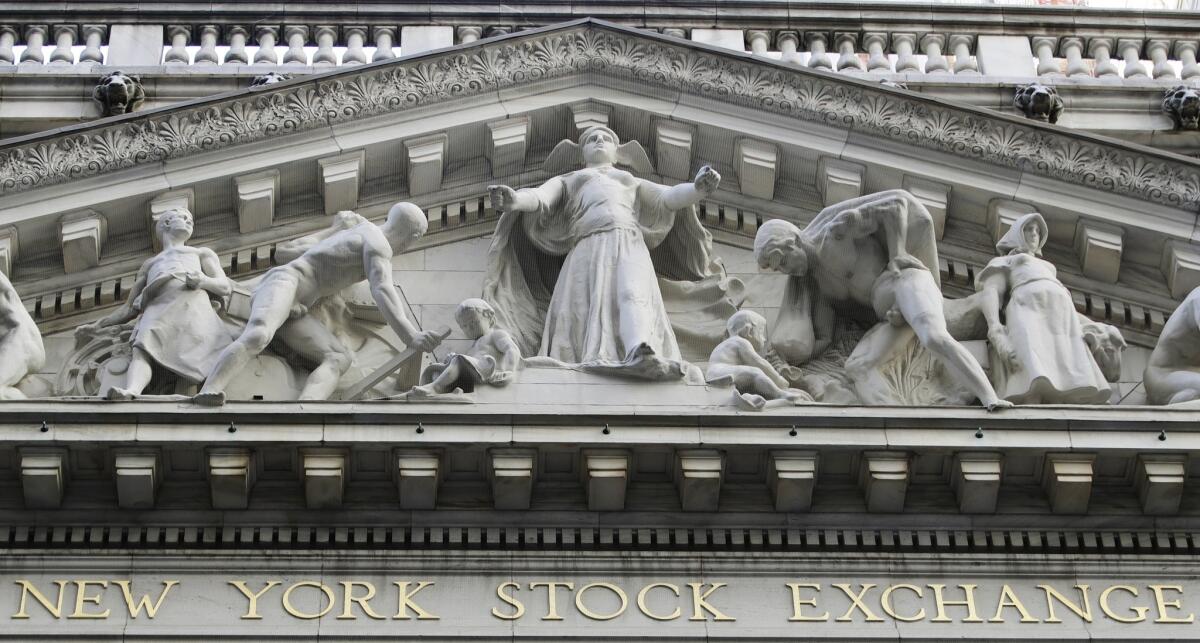Stocks reach new record highs as oil prices jump

- Share via
A jump in oil prices helped pull U.S. stocks to record highs Monday as investors continue to hope for a cut in oil production that could help prices go higher. The start of the week once again brought several corporate deals, with companies in the energy and technology industries making big moves.
The price of oil rose about 4% as investors hope the countries in OPEC, which collectively produce more than a third of the world’s oil, will soon finalize a deal that would lower oil production and help support prices. The gains were widespread, with technology, basic materials and utility companies all moving higher.
Stocks reached all-time highs over the summer and have built on those gains since the election. On Monday the Dow Jones industrial average, the Standard & Poor’s 500 and the Nasdaq composite all set records. So did the Russell 2000, an index of smaller companies, and the S&P’s small- and mid-size company indexes. The last time all those indexes set records on the same day was Dec. 31, 1999, according to Ryan Detrick, senior market strategist for LPL Financial.
The Dow rose 88.76 points, or 0.5%, to 18,956.69. The S&P 500 climbed 16.28 points, or 0.7%, to 2,198.18. The Nasdaq composite jumped 47.35 points, or 0.9%, to 5,368.86.
Benchmark U.S. crude oil rose to its highest price this month. It rose $1.80, or 3.9%, to $47.49 a barrel while Brent crude, the international standard, rose $2.04, or 4.4%, to $48.90 a barrel in London. That led to gains for energy companies. Marathon Oil advanced 5.5% to $16.48 and Exxon Mobil advanced 1.4% to $86.49.
OPEC representatives will meet in Vienna on Nov. 30. They have agreed to preliminary terms of a deal that will trim oil production, but the details remain to be determined. Quincy Krosby, market strategist at Prudential Financial, said investors are encouraged by the effort, but she doesn’t think a deal, if one happens, will have much effect on oil prices.
“There’s nothing to suggest the agreement’s going to hold,” she said. “When all is said and done, supply and demand will ultimately dictate the price.”
Meat producer Tyson Foods tumbled 14.5% to $57.60. The company’s fourth-quarter profit and sales fell far short of Wall Street’s forecasts as Tyson’s chicken business struggled. The company also said CEO Donnie Smith will step down at the end of this year, and company president Tom Hayes will replace him.
Competitor Hormel Foods fell 1.8% to $34.94.
Small-company stocks have surged since the election. The Russell 2000 has risen for 12 days in a row.
Technology stocks also made substantial gains. They have lagged the market since the election after a very strong performance over the summer. Facebook rose 4.1% to $121.77 while online payments company PayPal advanced 1.4% to $40.63 and Apple picked up 1.5% to $111.75.
Identity theft and fraud protection company LifeLock jumped 14.7% to $23.81 after security software maker Symantec agreed to buy the company for $2.3 billion. The deal values LifeLock at $24 a share. Symantec rose 3.2% to $24.52, a sign investors approve of the purchase. Sunoco Logistics agreed to buy Energy Transfer Partners in an all-stock deal worth about $20 billion. Both companies are involved in the Dakota Access oil pipeline, a project that’s been the subject of protests for months. A portion of that pipeline would pump oil under Lake Oahe, a reservoir in North Dakota, and the local Standing Rock Sioux tribe says it fears a leak could contaminate the drinking water on its reservation. The tribe also says the pipeline could disturb sacred sites.
Read more: Pipeline protesters clash with police in North Dakota »
Both companies traded lower after the deal was announced, as they won’t distribute as much cash to shareholders after combining. Energy Transfer Partners fell 7.2% to $36.52 and Sunoco Logistics skidded 6.6% to $24.47. Energy Transfer Equity, the general partner of Energy Transfer Partners, rose 3.6% to $17.92.
Gold inched up $1.10 to $1,209.80 an ounce. Silver fell 10 cents to $16.52 an ounce. Copper climbed 5 cents, or 1.9%, to $2.52 a pound.
The dollar slipped after trading at 13-year highs last week. The euro rose to $1.0612 from $1.0599. The dollar rose to 111.07 yen from 110.63 yen.
Bond prices rose. The yield on the 10-year Treasury note slipped to 2.32% from 2.35%. That helped utility stocks, which tend to do better when bond yields fall because investors seeking income buy the stocks for their big dividends.
Wholesale gasoline rose 6 cents, or 4.3%, to $1.40 a gallon. Heating oil rose 7 cents, or 4.6%, to $1.52 per gallon. Natural gas rose 11 cents, or 4%, to $2.95 per 1,000 cubic feet.
France’s CAC-40 index rose 0.6% and the DAX of Germany picked up 0.2%. The FTSE 100 index in Britain rose less than 0.1%. The Nikkei 225 of Japan rose 0.8%. South Korea’s Kospi fell 0.4% and the Hang Seng in Hong Kong edged up less than 0.1%.
ALSO
Wells Fargo is hit with new sanctions after fake-accounts scandal
The U.S. labor force’s guy problem: Why aren’t more men working?
Obama confronts an uncertain future on trade with the likely death of his signature TPP deal
UPDATES:
2:25 p.m.: This article was updated with closing prices, background information and an analyst comment.
7:35 a.m.: This article was updated with market prices and background information.
This article was originally published at 7:05 a.m.
More to Read
Inside the business of entertainment
The Wide Shot brings you news, analysis and insights on everything from streaming wars to production — and what it all means for the future.
You may occasionally receive promotional content from the Los Angeles Times.










